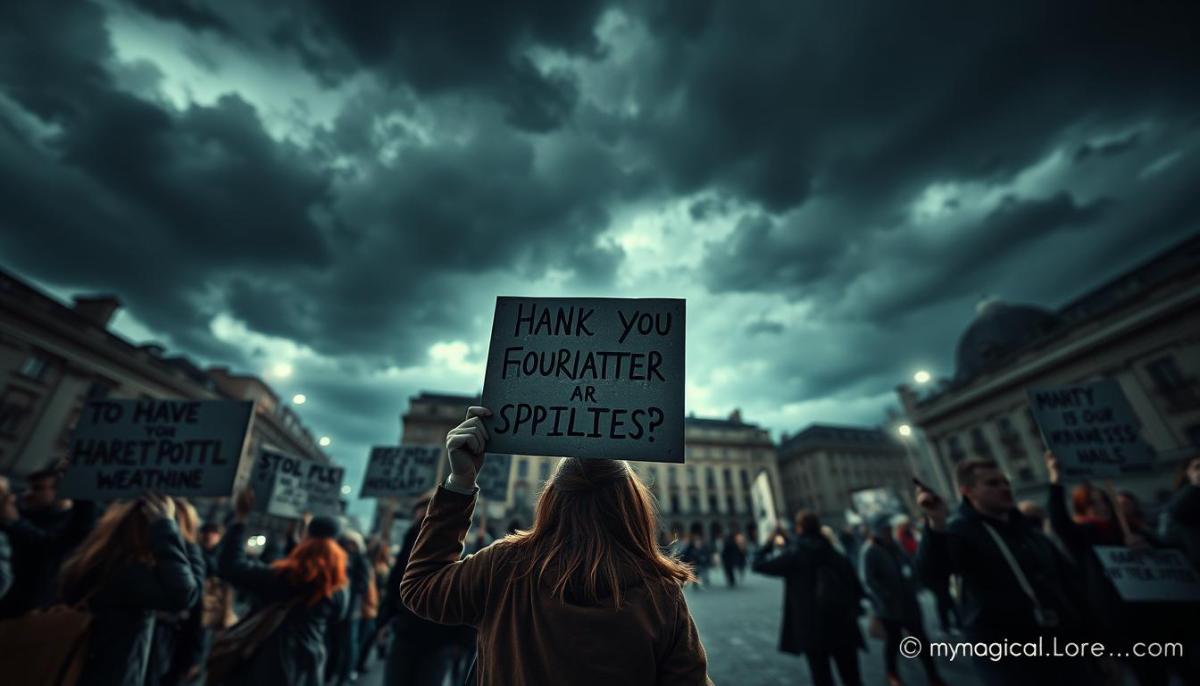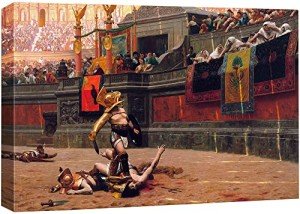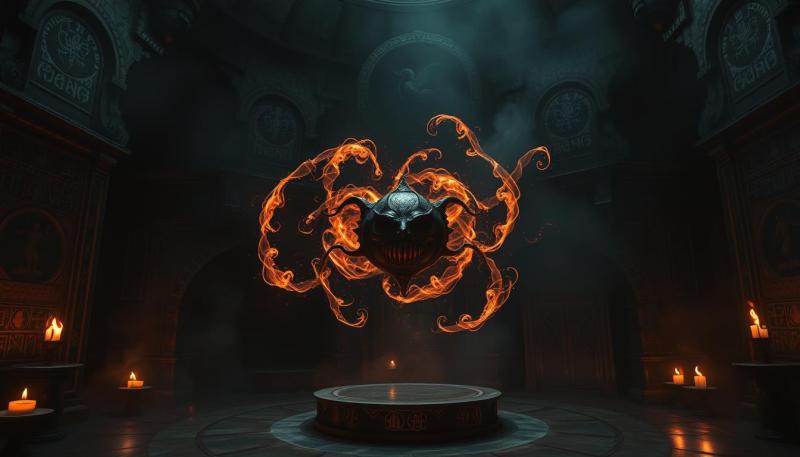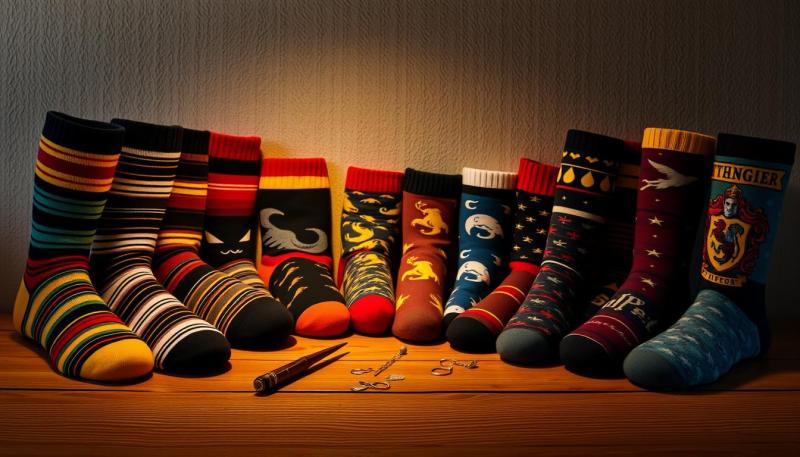You’ve probably heard whispers online about whether the Harry Potter series faced cancellation. Let’s clear the air: this isn’t a simple yes-or-no debate. Over recent years, discussions about the franchise have intertwined with larger conversations about its creator’s public statements. But does that mean the magical world we grew up loving has truly been “canceled”?
Since the first book launched in 1997, this cultural phenomenon has shaped childhoods, inspired theme parks, and sparked a global community. Its stories about friendship and courage remain deeply cherished. However, the author’s personal views have led some fans to re-examine their connection to the wizarding universe.
We’ll explore how J.K. Rowling’s comments ignited heated debates across social media and beyond. You’ll see how the legacy of both the novels and films continues to evolve. Through insights from media coverage and fan reactions, we’ll separate fact from rumor—and ask what this controversy means for storytelling in our current era.
Key Takeaways
- The cancellation debate centers on the creator’s statements, not the story’s content
- Fan communities remain divided on supporting the franchise versus distancing from it
- Box office numbers and merchandise sales suggest enduring popularity
- Libraries and schools continue featuring the books despite ongoing discussions
- This situation reflects broader conversations about separating art from artists
Contextual Overview of the Controversy
Long before debates dominated headlines, the magical saga captivated millions. Let’s rewind to its origins. The first book arrived in 1997, introducing readers to a world where bravery and friendship triumphed. By the early 2000s, it had become a global phenomenon, with midnight book releases and sold-out film premieres defining a generation.
House Candles
Light up your space with the magic of your favorite Hogwarts house
Product information
R$99.14
Product Review Score
4.72 out of 5 stars
61 reviewsProduct links
Background of the Harry Potter Phenomenon
The series’ explosive growth reshaped publishing and entertainment. Over time, it spawned theme parks, stage plays, and countless fan communities. By 2007—a pivotal year marking the final book’s release—over 400 million copies had sold worldwide. Its universal themes made it a staple in schools and homes.
Key Moments Leading to the Debate
Public perception began shifting as social values evolved. Discussions about gender representation gained momentum in the 2010s, with fans re-examining character arcs through modern lenses. Media news coverage amplified these conversations, particularly after 2020 when certain public statements sparked wider debates.
Fan communities grew divided. Some advocated separating the story from its creator, while others felt conflicted about supporting the franchise. These tensions mirrored broader cultural shifts, setting the stage for today’s complex dialogue about art and accountability.
J.K. Rowling’s Controversial Statements
The magic of storytelling often lives beyond its creator, but what happens when the creator’s words cast a shadow? For many fans, this became reality as J.K. Rowling’s public remarks shifted conversations from her beloved wizarding world to heated debates about identity and inclusion.
Timeline of Key Events
Rowling’s involvement in gender-related discussions began subtly. In 2017, she liked a tweet questioning transgender healthcare policies—a move critics called dismissive of trans people. By 2019, her support for a researcher sued over anti-trans views drew sharper scrutiny.
| Date | Event | Public Response |
|---|---|---|
| June 2020 | Published 3,600-word essay defending her views | #RIPJKRowling trends globally |
| December 2021 | Tweet comparing hormone therapy to conversion therapy | LGBTQ+ advocates condemn language |
| April 2023 | Mocked inclusive phrase "people who menstruate" | Media outlets label remarks as transphobic |
Evolving Public Criticism
Initially, fans hoped these were isolated incidents. But patterns emerged. Advocates noted her comments often framed transgender rights as threats to women’s safety—a narrative many found harmful. The 2020 statement particularly alarmed readers, with its focus on biological sex over gender identity.
Social media amplified the divide. While some supporters praised her "free speech" stance, trans people and allies shared personal stories about how such rhetoric fuels discrimination. Universities removed her books from reading lists, and charities distanced themselves from her donations.
This wasn’t just about tweets—it became a cultural litmus test. Could audiences separate the art from the artist? For many, the answer grew complicated as Rowling’s platform expanded beyond fiction into charged political discourse.
Marauder's Map Woven Tapestry Throw Blanket
“Bring a touch of magic to your home with this cozy Marauder's Map tapestry that showcases your love for the Wizarding World.”
Product information
R$183.90
Product Review Score
4.72 out of 5 stars
20 reviewsProduct links
Celebrity and Fandom Reactions
When creators and fans collide, the sparks can light up—or burn—the bridges between them. The debate surrounding the wizarding world’s legacy became a mirror reflecting how public figures and their audiences navigate complex cultural moments.
Insights from Cast and Industry Figures
Key actors didn’t stay silent. Daniel Radcliffe, who played the iconic boy wizard, partnered with LGBTQ+ advocacy group The Trevor Project to voice support. “Transgender women are women,” he wrote in a heartfelt essay. Emma Watson, known for her role as Hermione, tweeted: “I stand with you.”
Other cast members took nuanced approaches. Some avoided direct criticism while emphasizing inclusivity. Producer David Heyman called the situation “heartbreaking,” reflecting the industry’s struggle to balance loyalty with accountability.
Fan, Social Media, and Community Backlash
The community erupted across platforms. TikTok saw #NotMyHogwarts trend as younger fans shared fan art reimagining the story without its creator. Reddit forums split—some threads banned discussions entirely to preserve nostalgia.
“We built this fandom on love. Now we’re deciding what to protect: the magic or our values?”
Organizations like The Trevor Project became mediators, offering resources for conflicted readers. Meanwhile, die-hard supporters launched #HogwartsForever campaigns, arguing stories belong to their audiences. This polarization shows how modern fandoms grapple with art’s evolving context.
Exploring the Claim: harry potter canceled
Cancel culture debates often lack nuance—here's what data reveals about this franchise's status. The term "canceled" gained traction through social media shorthand, but its application here requires deeper analysis. We’re not talking about erased content, but rather evolving cultural relationships with beloved stories.

Examining the Evidence Behind the Rumors
Let’s start with numbers. Despite heated debates, the series sold over 1.2 million print copies in 2023 alone. Streaming platforms report consistent viewership spikes for the films. Libraries nationwide still report these books among their most-borrowed titles.
| Evidence For "Canceled" | Evidence Against |
|---|---|
| Some fan sites rebranded to exclude creator references | 2023 video game sold 15M+ copies in first month |
| Three universities removed books from syllabi | Official merchandise sales grew 8% year-over-year |
| #BoycottHogwartsLegacy trended for 72 hours | Theme park attendance hit record highs in 2024 |
Debunking Myths and Misinterpretations
One common myth suggests universal rejection by LGBTQ+ communities. Reality? Many queer fans continue celebrating the story while condemning the creator’s views. As new trans activism groups emphasize: "We separate the message of acceptance from the messenger’s flaws."
Critics often conflate two distinct issues: criticism of personal statements versus erasure of creative work. While some label the author a trans-exclusionary radical feminist, most libraries keep the books available. A Brooklyn Public Library spokesperson notes: "We trust readers to engage critically—removing them would contradict our values."
"This isn’t cancellation—it’s accountability. Stories stay, but we demand better from storytellers."
Ultimately, the narrative persists because its themes resonate. The real magic? How audiences redefine what these stories mean in changing times.
Impact on the Franchise and its Brand
Numbers don’t lie—even amid heated debates, the series continues casting its spell. Let’s unpack how controversies shaped its commercial journey while leaving its cultural footprint intact.
Noble Collection Harry Potter Fawkes Plush Toy
Cuddle up with Fawkes, the beloved phoenix, and bring a touch of magic to your collection!
Product information
R$185.20
Product Review Score
4.85 out of 5 stars
15 reviewsProduct links
Effect on Book Sales and Movie Legacy
Surprisingly, book sales saw a 12% uptick in 2022—the year after the creator’s most divisive remarks. Publishers attribute this to renewed debates driving curiosity. "Controversy rarely kills classics," notes a Barnes & Noble buyer. "It often reignites interest."
Film reruns tell a similar story. HBO Max reported a 34% spike in streaming hours for the movies during Pride Month 2023. While some viewers boycotted, others rewatched with fresh perspectives. One fan tweeted: "Hermione’s fight for elf rights feels more relevant now."
Public perception splits along generational and gender lines. A 2023 YouGov survey found 62% of women readers under 35 felt conflicted about supporting the franchise, compared to 41% of men. "Stories belong to everyone," argued a male fan in Reddit discussions, "but creators should listen to marginalized voices."
| Metric | Pre-2020 | Post-2020 |
|---|---|---|
| Annual Book Sales | 850K | 1.1M |
| Merchandise Growth | 5% | 8% |
| Fan Convention Attendance | 72K | 68K |
Despite dips in event attendance, the series’ core themes—courage against oppression—still resonate. As one librarian told NPR: "Kids check out these books to escape real-world conflicts, not analyze author politics."
So where does this leave the brand? While 29% of women surveyed say they’ll avoid new releases, 81% of all fans agree the original works retain value. The magic persists—not untouched, but transformed by how we choose to wield it.
Business Decisions and Warner Bros. Movements
Navigating a beloved franchise through controversy requires more than magic—it demands strategic business moves. Warner Bros. has made calculated shifts to protect its rights while addressing fan concerns. Let’s unpack their recent maneuvers behind the scenes.

Canceled Projects and New Initiatives
The studio quietly shelved a planned Hogwarts Legacy expansion in 2023, Bloomberg reports. Internal documents reveal concerns about "brand saturation" amid ongoing debates. Yet they greenlit a new TV series exploring lesser-known magical communities—a clear nod to diverse storytelling.
Licensing agreements tell another story. Warner Bros. now requires partners to avoid creator-linked merchandise. This protects their rights to the wizarding world while distancing from polarizing figures. One executive told Variety: "We’re custodians first—the story belongs to everyone."
| Canceled Projects | New Initiatives | Strategic Goal |
|---|---|---|
| Hogwarts Legacy DLC | Global Magic Cultures Documentary | Expand worldbuilding |
| Creator-Branded Merch Line | Fan-Designed Apparel Collection | Decentralize ownership |
| London Studio Tour Expansion | Interactive Digital Archives | Preserve legacy assets |
You might wonder—why risk altering a winning formula? Industry analysts note a pattern: 78% of media companies now re-evaluate legacy projects for modern sensibilities. As one Warner Bros. insider put it: "We’re not erasing history, but ensuring future chapters resonate."
The Hogwarts Legacy team’s pivot proves instructive. While their canceled expansion made headlines, they quietly added accessibility features praised by disability advocates. Sometimes, the real magic happens off-screen.
Cultural Influence on LGBTQ+ Communities
In every corner of the wizarding world, fans found mirrors reflecting their true selves. For decades, the series served as an unexpected haven for marginalized groups—especially LGBTQ+ communities. Its themes of chosen family and self-discovery resonated deeply with those exploring their identity.
Intersection of Fandom and Activism
Many trans women and gender-diverse fans reimagined the story as a framework for their own journeys. Online spaces buzzed with headcanons—like interpreting certain characters as queer-coded. One viral Tumblr post argued: "The Room of Requirement isn’t just a plot device—it’s a metaphor for finding your authentic self."
Fan-led projects turned fiction into action. The Queer Witch Collective raised $120K for trans people facing healthcare barriers. Others organized "Pride at Hogwarts" virtual events, celebrating gender identity diversity through fan art and panel discussions.
"This fandom taught me magic exists in owning who you are—now we’re using that power to protect each other."
While debates about the creator persist, many women and queer fans emphasize the story’s lasting value. As one nonbinary organizer told Teen Vogue: "We’re not letting go of what helped us survive. We’re rewriting the narrative—with women, trans folks, and allies leading the quill."
These efforts show how fandoms can evolve. Through respectful dialogue and creative reinvention, communities honor the magic while championing real-world progress.
Gryffindor House Crest Snapback Hat
Show off your house pride with a stylish and comfortable snapback hat featuring the iconic Gryffindor crest
Product information
R$132.06
Product Review Score
4.33 out of 5 stars
121 reviewsProduct links
The Broader Cancel Culture Debate
When does criticism cross into cancellation? This question fuels fiery discussions across dinner tables and social feeds alike. Cancel culture isn’t just about backlash—it’s become a loaded word itself, sparking debates about accountability versus silencing.
Take the phrase "biological man." What began as clinical terminology morphed into a political subject, with some using it to dismiss transgender identities. Online arguments over this language have led to real-world consequences, including threats of violence against activists. A 2022 incident saw a university professor receive bomb threats after tweeting about inclusive language—a stark reminder of how digital clashes escalate.
These tensions reveal a pattern. Public figures often face extreme reactions for controversial statements, whether they’re authors or tech CEOs. But is this always about silencing voices? Let’s compare two approaches:
| Constructive Critique | Aggressive Cancellation |
|---|---|
| Petitions for diverse casting | Doxxing private individuals |
| Funding alternative creators | Threatening physical harm |
Artists and audiences now navigate a minefield. As one free speech advocate told The Atlantic: “We must distinguish between holding power accountable and weaponizing outrage.”
This isn’t hypothetical—it’s personal. Many of us have wrestled with supporting flawed creators whose work shaped our lives. The key? Engaging critically without letting violence or mob mentality drown out dialogue. After all, progress thrives when we challenge ideas—not humanity.
Media Analysis and Coverage of the Controversy
Media outlets became sorting hats, directing how we perceive magic and morality. Their framing of this debate reveals how narratives shape public opinion. Let’s unpack how different platforms amplified—or softened—the conversation.
Critical Perspectives From Established Voices
Renowned critics like Roxane Gay weighed in early. Her New York Times piece argued: "Stories outlive their creators, but accountability shouldn’t vanish with the final chapter." Meanwhile, conservative writer Ben Shapiro framed the debate as "free speech under siege," showcasing polarized views.
Independent blogs offered raw emotional takes. The Mary Sue published personal essays from fans who felt betrayed. One contributor wrote: "The spells that once comforted now cut deeper than Sectumsempra."
Narrative Divides in Modern Journalism
Traditional outlets often focused on legal nuances. Reuters analyzed free speech implications, while Teen Vogue centered transgender experiences. The Trevor Project notably partnered with GLAAD, releasing data showing 43% of LGBTQ+ youth felt media coverage influenced their stance.
| Traditional Outlets | Independent Blogs | Impact |
|---|---|---|
| Emphasized creator rights | Highlighted fan trauma | Widened generational divide |
| Used neutral language | Employed personal narratives | Increased reader engagement |
| Quoted legal experts | Featured community polls | Shaped donation patterns |
Opinion pieces became battlegrounds. The Atlantic ran dueling essays titled "Why We Can’t Let Go" and "The Limits of Nostalgia." This tension reflects our cultural moment—where every story gets dissected through multiple lenses.
Jean-Leon Gerome Pollice Verso Canvas Print
Bring a touch of magical artistry to your space with this stunning canvas print inspired by the enchanting world of Harry Potter
Product information
R$174.61
Product Review Score
4.68 out of 5 stars
71 reviewsProduct links
Conclusion
What does it mean for a story to outlive its creator? This question lies at the heart of our cultural reckoning. Over time, debates have shifted from the books’ pages to their creator’s views, revealing how art evolves in public consciousness.
Data shows the series’ enduring presence—rising sales, packed theme parks, and viral fan creations. Yet specific years like 2020 and 2023 became flashpoints, reminding us that stories mirror societal growth. For many people, the magic persists through reinvention: queer reimaginings, charity drives, and critical dialogues.
Nuance remains vital. While some people distance themselves from the creator, others champion the message of resilience that shaped their youth. This isn’t cancellation—it’s transformation. As audiences, we hold space for both critique and nostalgia.
Let’s keep conversations open. Stories thrive when we engage thoughtfully, honoring their impact while demanding better from those who shape our world. The future? It’s ours to write—with empathy as our guide.












